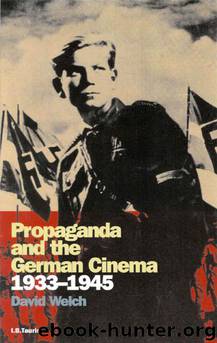David Welch by Propaganda & the German Cinema 1933-1945

Author:Propaganda & the German Cinema 1933-1945 [Propaganda & 1933-1945, the German Cinema]
Language: eng
Format: epub
Published: 0101-01-01T00:00:00+00:00
53. BA, NS 18/283, 27 July 1942. For the complete cross-section of opinions, see Welch, ‘Propaganda and the German Cinema’, pp. 474-8.
54. Table Talk, pp. 646-7.
55. BA, NS 18/283, 25 September 1942. In fact it had been decided to use Stettin and to restrict reviews to the local press towards the end of August. BA, Sammlung Sänger, Zsg, 102/63, 28 August 1942.
56. IfZ, Goebbels Tagebuch, entry for 23 September 1942.
57. BA, Sammlung Sänger, Zsg, 102/63, 5 October 1942.
58. The other two films were Das Flotenkonzert von Sanssouci ( The Flute Concert of Sanssouci, 1930) and Barberina, Die Tanzerin von Sanssouci ( The King’s Dancer, 1932).
59. Kalbus, p. 75.
60. When Harlan decided to cast Werner Krauss as Frederick, Hitler personally intervened and insisted that Gebühr should continue in the role that he had specialized in in all but one of the Fridericus films. Harlan, pp. 181–2.
61. IfZ, Goebbels Tagebuch, entry for 19 February 1942.
62. Harlan, pp. 184–8.
63. Quoted in Leiser, p. 113.
64. IfZ, Goebbels Tagebuch, entry for 28 January 1942. Cf. Goebbels’s pessimistic diary entry of 31 May 1941, when he referred to the film as a ‘failure’, Taylor, p. 393.
65. Ibid., entry for 2 March 1942.
66. Lochner, pp. 87–95.
67. IfZ, Goebbels Tagebuch, entry for 20 March 1942.
68. J. Goebbels, Das Eherne Herz (Munich, 1943), p. 290.
69. BA, R58/172, 28 May 1942.
70. BA, NS18/342, Note from RMVP to Tobis dated 10 March 1942.
71. BA, NS18/342, this is a folder on Der grosse König. This exchange of dialogue is undated.
72. Aktuelle Filmbücher (Stephan, 1942).
73. This had been decided early in February, but Goebbels refused to allow the press to announce it lest it destroy the dramatic effect of the première. BA, Sammlung Sänger, Zsg, 102/63, 6 February 1942.
74. BA, NS18/342, 3 March 1942 and 4 March 1942.
75. BA, Sammlung Sänger, Zsg, 102/63, 2 March 1942. See also Boelcke, p. 287.
76. BA, R58/172, 28 March 1942.
77. J. Goebbels, Das Eherne Herz, p. 289. See also Bramsted, pp. 222–3.
78. Deutsche Wochenschau No. 712. This is available for hire at the Imperial War Museum.
79. J. Goebbels, ‘Der Führer’, in Das Reich, 31 December 1944. An analysis of this revealing article can be found in Baird, pp. 241–3.
Propaganda/German Cinema 29/1/01 16:05 Page 158
PROPAGANDA AND THE GERMAN CINEMA 1933–1945
158
80. Quoted in Bramsted, p. 448. Cf. Baird, p. 249.
81. H. Trevor-Roper (ed.), The Goebbels Diaries (London, 1978), p. 215. Cf. Bullock, pp. 780–1.
82. Fest, p. 734.
83. Der Panzerbär 29 April 1945, quoted in Baird, p. 255.
84. I am indebted to Marcus Phillips for this observation.
85. Film-Kurier, 21 December 1943, quoted in Wulf, p. 397.
86. Sander, p. 118.
Propaganda/German Cinema 29/1/01 16:05 Page 159
VI
WAR AND THE MILITARY IMAGE
Big and small people, the rich and the poor, compete with each other to devote themselves completely to the task of enabling the nation to fight out its gigantic struggle for survival victoriously. In two and a half years we have become a nation of warriors.
Joseph Goebbels (Speech of 25 January 1942)
THE outbreak of war provided Goebbels with a new impetus, and he
Download
This site does not store any files on its server. We only index and link to content provided by other sites. Please contact the content providers to delete copyright contents if any and email us, we'll remove relevant links or contents immediately.
| Africa | Americas |
| Arctic & Antarctica | Asia |
| Australia & Oceania | Europe |
| Middle East | Russia |
| United States | World |
| Ancient Civilizations | Military |
| Historical Study & Educational Resources |
Room 212 by Kate Stewart(5102)
The Crown by Robert Lacey(4802)
Endurance: Shackleton's Incredible Voyage by Alfred Lansing(4749)
The Iron Duke by The Iron Duke(4345)
The Rape of Nanking by Iris Chang(4196)
Joan of Arc by Mary Gordon(4092)
Killing England by Bill O'Reilly(3989)
Say Nothing by Patrick Radden Keefe(3974)
I'll Give You the Sun by Jandy Nelson(3424)
Shadow of Night by Deborah Harkness(3352)
Hitler's Monsters by Eric Kurlander(3327)
Mary, Queen of Scots, and the Murder of Lord Darnley by Alison Weir(3194)
Blood and Sand by Alex Von Tunzelmann(3191)
Eleanor & Park by Rainbow Rowell(3148)
Darkest Hour by Anthony McCarten(3117)
Margaret Thatcher: The Autobiography by Thatcher Margaret(3072)
Book of Life by Deborah Harkness(2921)
Red Famine: Stalin's War on Ukraine by Anne Applebaum(2917)
The One Memory of Flora Banks by Emily Barr(2853)
